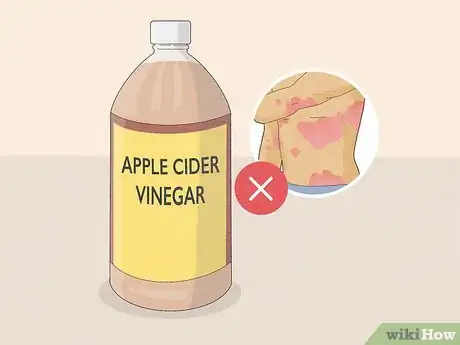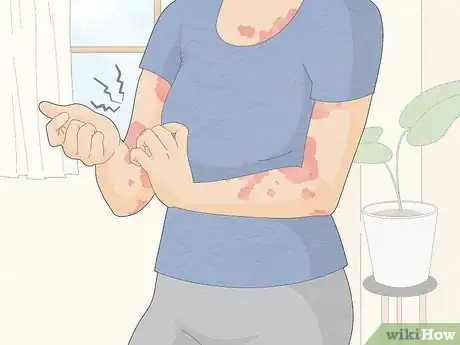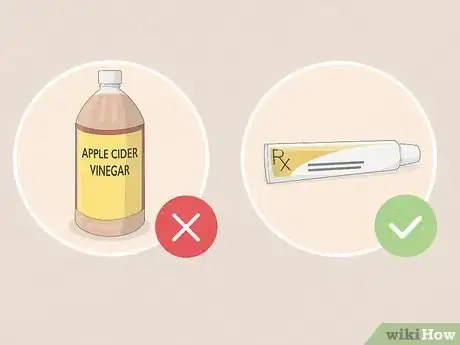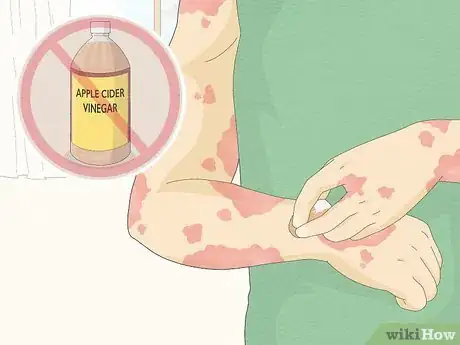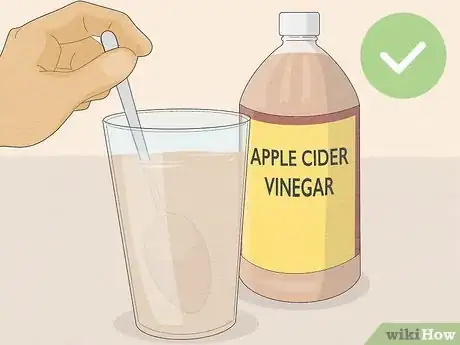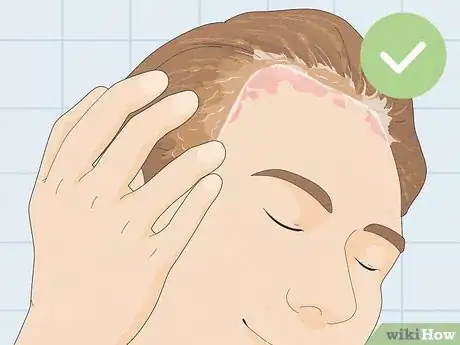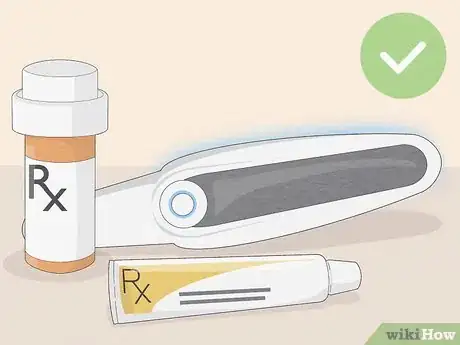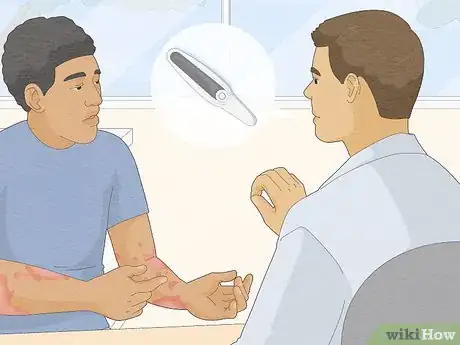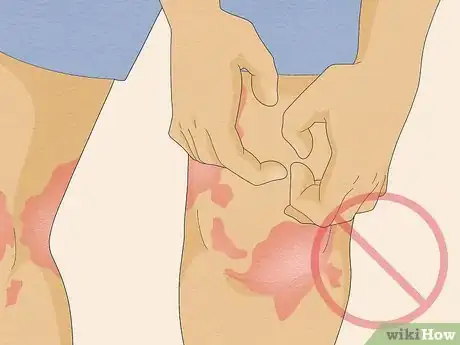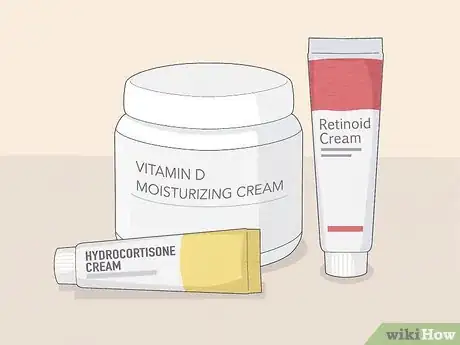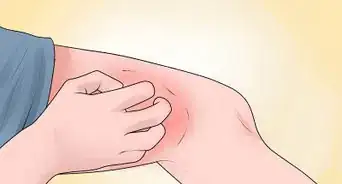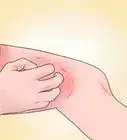This article was co-authored by Heather Richmond, MD and by wikiHow staff writer, Eric McClure. Dr. Heather Richmond, MD is a board certified Dermatologist at Dermatology and Laser Surgery Center in Houston, Texas. With over nine years of experience, Dr. Richmond specializes in comprehensive dermatology including medical, surgical, and cosmetic procedures. She graduated cum laude from Yale University with a BA in Molecular, Cellular, and Developmental Biology. She earned her MD from the University of California, Irvine School of Medicine, where she was inducted into the Alpha Omega Alpha Honor Medical Society. She completed her Internal Medicine internship at Cedars-Sinai Medical Center and her Dermatology residency at The University of Texas MD Anderson Cancer Center in Houston. Dr. Richmond is a fellow of the American Academy of Dermatology and is a member of the American Society for Dermatologic Surgery, American Society for Laser Medicine and Surgery, and the Texas and Houston Dermatological Societies.
There are 21 references cited in this article, which can be found at the bottom of the page.
wikiHow marks an article as reader-approved once it receives enough positive feedback. In this case, several readers have written to tell us that this article was helpful to them, earning it our reader-approved status.
This article has been viewed 230,065 times.
Apple cider vinegar is a popular ingredient in a variety of different DIY remedies. Unfortunately, while it may be helpful in very small amounts when it’s added to your diet, it’s probably going to do more harm than good when it comes to skin conditions. With that said, there are plenty of ways that you can soothe your psoriasis outbreaks and reduce discomfort. If you want to learn more about why apple cider vinegar isn’t ideal and learn about the proven treatments that will work, you’re in the right place!
Steps
Why isn’t apple cider vinegar ideal for psoriasis?
-
1Apple cider vinegar won’t soothe any of your symptoms. Vinegar is slightly acidic, and the premise here is that when you have a skin problem your skin’s pH is off, so adding an acid should rebalance it.[8] Unfortunately, vinegar doesn’t appear to have anything more than a temporary impact on skin pH, and you’re likely to experience additional pain or irritation on your already-sensitive skin.[9]
-
2Vinegar can’t treat the underlying causes of psoriasis. Even if apple cider vinegar were good for your skin, it still likely wouldn’t help with the underlying problem. Psoriasis is caused by an overactive immune system and it often flares up due to environmental triggers.[10] [11] Unfortunately, putting apple cider vinegar on your skin won’t help your immune system, and it won’t minimize the impact of environmental triggers.
What’s the most effective treatment for psoriasis?
-
1Topical creams, light therapy, and medication are all effective. There are three ways that doctors will approach psoriasis treatment: creams, light therapy, and medication. These are all effective options, but what works for one person may not work for you. See your doctor to explore the various options out there. [19]
- Topical creams and ointments reduce inflammation, soothe pain, and moisturize your skin.[20] [21] You can buy medical-grade creams that have been clinically tested.[22]
- Try applying thick emollient lotions throughout the day, especially within the first few minutes of a shower.[23]
- Avoid buying them from unknown websites on the internet.[24]
- If their price is extremely low compared to their retail price, they may not be worth buying.[25]
- Light therapy involves exposing your skin to high levels of UVB light for a few minutes. This stunts the growth of skin cells, which are the cause of those obnoxious rashes.[26]
- Oral medications and injections help to suppress inflammation, or keep your immune system from overreacting.[27]
-
2Work with your doctor to find the best combination for you. Some people get no benefit from something like light therapy, while others see massive benefits. Everyone is different, and what’s ideal for you may not be ideal for someone else. This is why it’s so important to work with your doctor to find the best treatment combination for you.[28]
- It may take a bit of trial and error to find the best treatment for you. It can be irritating to spend so much time trying treatments that don’t work, but rest assured that psoriasis is very treatable once you find the best combination for you.
How can I speed up the healing process for psoriasis?
-
1Reducing your stress levels will have a huge impact. Stress is a common trigger for many people with psoriasis. If possible, avoid situations where you suspect you’re going to get stressed out. Develop a coping mechanism, like deep breathing exercises, to treat stress in the moment. Get plenty of sleep, exercise regularly, and eat a healthy diet. All of this should help to minimize your outbreaks and speed up healing time.[29]
- Soaking your skin in Epsom salts may help alleviate psoriasis discomfort.[30] [31]
- This can become a vicious cycle if your psoriasis causes you stress. You see the skin patches, they stress you out, and then the stress makes things worse. Do your best to remind yourself that psoriasis is exceptionally common, and it will go away. If you don’t treat it like a big deal, it will disappear sooner than you can imagine!
-
2Keep your skin clear and healthy, and avoid inclement weather. Avoid harsh and abrasive soaps, don’t scratch, and put sunscreen on if you’re going outside. The more your skin gets damaged, the more likely those psoriasis patches will be to stick around. Crazy changes in the weather can also keep your skin from healing, so cover up if you’re heading out in the cold or keep your skin clear if it’s going to be hot outside.[32]
-
3Apply a corticosteroid, vitamin D, or retinoid cream to your skin. Your doctor may have prescribed you a cream or ointment, and if they have, use that as directed. Otherwise, swing by your local pharmacy and pick up a healing cream or ointment containing vitamin D or retinoids. Read the label and apply the healing cream to your skin as directed. This should help your psoriasis clear up.[33]
- You could also use a product that contains salicylic acid or coal tar.[34] These are less popular options for psoriasis, though.
Expert Q&A
-
QuestionWhat are the disadvantages of bathing using apple cider vinegar?
 Alina Goldenberg MD, MAS, FAADDr. Alina Goldenberg is a Board Certified Dermatologist. She specializes in allergic contact and atopic dermatitis, patch testing, skin cancer screening and treatment, and medical and cosmetic dermatology. Dr. Goldenberg has published numerous peer-reviewed publications, textbook chapters and received grants and awards from organizations such as the National Institutes of Health and the American Skin Association. She holds a BA in Public Health from The University of California, Berkeley, a MAS in Clinical Research, and an MD from The University of California, San Diego.
Alina Goldenberg MD, MAS, FAADDr. Alina Goldenberg is a Board Certified Dermatologist. She specializes in allergic contact and atopic dermatitis, patch testing, skin cancer screening and treatment, and medical and cosmetic dermatology. Dr. Goldenberg has published numerous peer-reviewed publications, textbook chapters and received grants and awards from organizations such as the National Institutes of Health and the American Skin Association. She holds a BA in Public Health from The University of California, Berkeley, a MAS in Clinical Research, and an MD from The University of California, San Diego.
Board Certified Dermatologist Despite possessing antibacterial and antifungal properties, you shouldn't bathe in vinegar, as that may lead to skin irritation in atopic dermatitis and is not recommended.
Despite possessing antibacterial and antifungal properties, you shouldn't bathe in vinegar, as that may lead to skin irritation in atopic dermatitis and is not recommended. -
QuestionHow does apple cider vinegar help skin?
 Alina Goldenberg MD, MAS, FAADDr. Alina Goldenberg is a Board Certified Dermatologist. She specializes in allergic contact and atopic dermatitis, patch testing, skin cancer screening and treatment, and medical and cosmetic dermatology. Dr. Goldenberg has published numerous peer-reviewed publications, textbook chapters and received grants and awards from organizations such as the National Institutes of Health and the American Skin Association. She holds a BA in Public Health from The University of California, Berkeley, a MAS in Clinical Research, and an MD from The University of California, San Diego.
Alina Goldenberg MD, MAS, FAADDr. Alina Goldenberg is a Board Certified Dermatologist. She specializes in allergic contact and atopic dermatitis, patch testing, skin cancer screening and treatment, and medical and cosmetic dermatology. Dr. Goldenberg has published numerous peer-reviewed publications, textbook chapters and received grants and awards from organizations such as the National Institutes of Health and the American Skin Association. She holds a BA in Public Health from The University of California, Berkeley, a MAS in Clinical Research, and an MD from The University of California, San Diego.
Board Certified Dermatologist Apple cider vinegar is one of the most commonly utilized natural remedies in dermatology. Vinegar can help rebuild the skin barrier by reforming the acidic mantle — the acidic pH of the skin barrier, which is often broken in atopic dermatitis and contact dermatitis. That said, it should only be used diluted and with professional supervision.
Apple cider vinegar is one of the most commonly utilized natural remedies in dermatology. Vinegar can help rebuild the skin barrier by reforming the acidic mantle — the acidic pH of the skin barrier, which is often broken in atopic dermatitis and contact dermatitis. That said, it should only be used diluted and with professional supervision. -
QuestionWhat should I use instead of apple cider vinegar?
 Alina Goldenberg MD, MAS, FAADDr. Alina Goldenberg is a Board Certified Dermatologist. She specializes in allergic contact and atopic dermatitis, patch testing, skin cancer screening and treatment, and medical and cosmetic dermatology. Dr. Goldenberg has published numerous peer-reviewed publications, textbook chapters and received grants and awards from organizations such as the National Institutes of Health and the American Skin Association. She holds a BA in Public Health from The University of California, Berkeley, a MAS in Clinical Research, and an MD from The University of California, San Diego.
Alina Goldenberg MD, MAS, FAADDr. Alina Goldenberg is a Board Certified Dermatologist. She specializes in allergic contact and atopic dermatitis, patch testing, skin cancer screening and treatment, and medical and cosmetic dermatology. Dr. Goldenberg has published numerous peer-reviewed publications, textbook chapters and received grants and awards from organizations such as the National Institutes of Health and the American Skin Association. She holds a BA in Public Health from The University of California, Berkeley, a MAS in Clinical Research, and an MD from The University of California, San Diego.
Board Certified Dermatologist Sea salt has been used for decades as a remedy for inflammatory skin conditions, particularly psoriasis. Imitating the concentration of the Dead Sea, which has been shown to improve psoriasis symptoms, may offer a limited benefit as a psoriasis treatment.
Sea salt has been used for decades as a remedy for inflammatory skin conditions, particularly psoriasis. Imitating the concentration of the Dead Sea, which has been shown to improve psoriasis symptoms, may offer a limited benefit as a psoriasis treatment.
References
- ↑ https://extension.wvu.edu/food-health/cooking/apple-cider-vinegar-myths-facts
- ↑ https://pubmed.ncbi.nlm.nih.gov/34077434/
- ↑ Alina Goldenberg MD, MAS, FAAD. Board Certified Dermatologist. Expert Interview. 16 August 2021.
- ↑ https://www.ncbi.nlm.nih.gov/pmc/articles/PMC4735895/
- ↑ https://www.ncbi.nlm.nih.gov/pmc/articles/PMC5868783/
- ↑ https://extension.wvu.edu/food-health/cooking/apple-cider-vinegar-myths-facts
- ↑ https://www.ncbi.nlm.nih.gov/pmc/articles/PMC1785201/
- ↑ https://nationaleczema.org/get-the-facts-acv/
- ↑ https://pubmed.ncbi.nlm.nih.gov/31328306/
- ↑ https://www.mayoclinic.org/diseases-conditions/psoriasis/symptoms-causes/syc-20355840
- ↑ Lydia Shedlofsky, DO. Dermatologist. Expert Interview. 30 September 2020.
- ↑ https://www.mayoclinic.org/diseases-conditions/psoriasis/diagnosis-treatment/drc-20355845
- ↑ https://www.ncbi.nlm.nih.gov/pmc/articles/PMC1785201/
- ↑ https://www.ncbi.nlm.nih.gov/pmc/articles/PMC4479370/
- ↑ https://www.health.harvard.edu/blog/apple-cider-vinegar-diet-does-it-really-work-2018042513703
- ↑ https://www.health.harvard.edu/blog/apple-cider-vinegar-diet-does-it-really-work-2018042513703
- ↑ https://www.psoriasis.org/integrative-approaches-to-care/
- ↑ https://www.psoriasis.org/integrative-approaches-to-care/
- ↑ https://www.nhs.uk/conditions/psoriasis/treatment
- ↑ https://www.nhs.uk/conditions/psoriasis/treatment
- ↑ Lydia Shedlofsky, DO. Dermatologist. Expert Interview. 30 September 2020.
- ↑ Heather Richmond, MD. Board Certified Dermatologist. Expert Interview. 15 September 2020.
- ↑ Lydia Shedlofsky, DO. Dermatologist. Expert Interview. 30 September 2020.
- ↑ Heather Richmond, MD. Board Certified Dermatologist. Expert Interview. 15 September 2020.
- ↑ Heather Richmond, MD. Board Certified Dermatologist. Expert Interview. 15 September 2020.
- ↑ https://www.nhs.uk/conditions/psoriasis/treatment
- ↑ https://www.nhs.uk/conditions/psoriasis/treatment
- ↑ https://www.nhs.uk/conditions/psoriasis/treatment/
- ↑ https://www.health.harvard.edu/diseases-and-conditions/a-deeper-look-at-psoriasis
- ↑ https://www.psoriasis.org/over-the-counter/
- ↑ Alina Goldenberg MD, MAS, FAAD. Board Certified Dermatologist. Expert Interview. 16 August 2021.
- ↑ https://www.psoriasis.org/causes/
- ↑ https://www.mayoclinic.org/diseases-conditions/psoriasis/diagnosis-treatment/drc-20355845
- ↑ https://www.mayoclinic.org/diseases-conditions/psoriasis/diagnosis-treatment/drc-20355845
- ↑ https://www.sciencedirect.com/science/article/abs/pii/S0271531784800494
